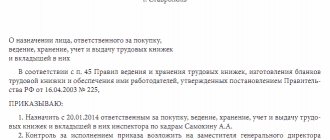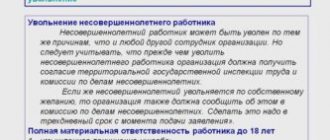What is disciplinary and financial liability and their legal regulation?
In Art. 22 of the Labor Code stipulates the employer’s right to choose liability for an employee. An employee is subject to disciplinary punishment in case of violation of labor discipline and his guilt is established.
When holding an employee accountable (disciplinary or financial), the employer should take into account the provisions of Chapters 30, 37 of the Labor Code.
Material liability means the employee’s obligation to compensate the employer for property damage caused by him as a result of non-fulfillment or improper performance of official or labor duties. It is allowed to involve both the employee and the employer.
Disciplinary liability is the measures taken by the employer against an employee who has committed a disciplinary offense. It occurs when an employee violates labor discipline, which is defined by law as mandatory submission to the current rules of conduct under the Labor Code, collective agreement, and other federal and local acts.
Disciplinary measures play an important role in labor relations and can perform the following functions:
- Regulatory - in this case, they determine the boundaries of the employee’s lawful performance of his job duties.
- Educational – they convince the employee that his actions may entail disciplinary liability.
- Preventive – prevent possible violations of labor discipline.
- Punitive – implies adverse consequences for violating employees.
In addition to the Labor Code, types of responsibility can be specified in an individual employment contract or other local document. At the same time, liability cannot be higher in relation to the employee to the employer, and lower – from the employer in relation to the employee, than is provided for by the Labor Code or other federal laws.
Dismissal
In principle, this is an extreme form of disciplinary and financial liability. For this measure, the main thing is not the number of offenses, but their severity. Although in practice, before dismissal, a person is usually given one more chance to improve.
In order to dismiss an employee, the employer must not only prove the fact of misconduct, but also the degree of its severity.
In addition to standard situations (absenteeism or tardiness), the director of a branch can be fired if it is proven that he caused material damage to the enterprise through unlawful use of it, a teacher for repeated gross violation of the charter of an educational organization, and so on.
However, it is not considered a misdemeanor if a person refused to do work that is dangerous to his health or life, or did not want to do something that was not provided for in the employment agreement.
Bringing to material and disciplinary liability through dismissal does not entail non-payment of wages for the time actually worked. The employer is also obliged to pay compensation for unused vacation days.
Disciplinary responsibility
The grounds for bringing this type of liability include: violation by an employee of a job description, failure to perform (or improper performance) of his or her job duties.
In order for the employer to have grounds for bringing an employee to disciplinary punishment, he must make sure that he has violated the requirements of labor discipline, which were documented and with which the employee was previously familiarized with his signature.
According to statistics, the most common types of disciplinary offenses include:
- Failure to fulfill labor duties stipulated by the employment contract.
- Failure to comply with oral or written instructions from management.
- Various violations of labor discipline : lateness, absence from work without a good reason, refusal of a medical examination, being intoxicated at the workplace, etc.
- Committing guilty actions in relation to the employer’s property : embezzlement, theft, damage to property, etc.
Bringing an employee to disciplinary liability is carried out on the basis of Art. 192 of the Labor Code. There are three types of penalties under labor law: reprimand, dismissal and reprimand. But special federal laws and regulations may provide for other forms of punishment: a severe reprimand, demotion, etc.
Collection in the form of a fine for violation of labor discipline is illegal and may serve as the basis for imposing a fine on the employer in accordance with the norms of the Code of Administrative Offenses of the Russian Federation.
When choosing a sanction, the employer should take into account the severity of the employee’s offense, personal characteristics, the presence of consequences from the violation and other factors under Part 5 of Art. 192 TK. If a penalty was applied to an employee that clearly does not correspond to the misconduct, then this may serve as a basis for its cancellation.
According to the provisions of the Labor Code, an employee can be dismissed for violating labor discipline in the following cases:
- In case of repeated failure to fulfill labor duties without good reason under clause 5, part 1, art. 81 of the Labor Code.
- In case of a single gross violation of labor duties by an employee under clause 6, part 1, art. 81 (for example, for absenteeism or drinking alcohol at work) or by a manager under clause 10 of Part 1 of Art. 81 TK.
- When unjustified decisions are made by the management of the organization (branch or representative office), which led to the loss of property or violation of its safety.
- In case of repeated violation of the charter of the educational institution under Part 1 of Art. 366 TK.
Also, the employer has the right to impose on the employee only one selected penalty, formalized by his order. To issue an order, the employer has one month from the moment the fact of misconduct is established and no more than six months from the date the employee committed a violation of labor discipline.
When bringing an employee to punishment, the stages of documenting the misconduct committed by the employee, conducting an investigation into the fact of the incident to establish guilt, and requesting an explanatory statement from the employee are quite important. The absence of one of these stages may become grounds for invalidation of the penalty.
In what order is the amount of damage determined and recovered?
In order to demand compensation from an employee for damage, it is necessary to prove his guilt in committing the actions that caused the harm.
When presenting grounds for bringing to liability, it is necessary to indicate the specific amount of losses actually incurred by the enterprise, based on the market value on the day it was caused, comparing with the accounting data of this property, taking into account the degree of wear and tear depending on the period of operation (purchase).
The amount claimed by the employer for compensation cannot be lower than according to the accounting department of the enterprise.
An inspection is being carried out by a specially created commission with the involvement of expert specialists in order to be able to establish the true extent of the damage caused and the reasons why the current situation arose.
An employee suspected of being responsible for events that led to damage or destruction of property is required to provide a written explanation.
By analogy with bringing to disciplinary liability, if an employee refuses to give an explanation, a report is drawn up signed by several witnesses.
At the request of the employee, he must be familiarized with all the materials of the ongoing investigation.
The results of the investigation are documented in an act that must reflect:
- established facts of the employee’s guilt in his actions that caused the harm;
- or the absence of grounds to hold the employee financially liable.
The appendix indicates the documents that serve as the basis for the final conclusions.
Material liability
Subject to the provisions of Art. 233 of the Labor Code, an employee can be held financially liable only if the employee is at fault. Fault is understood as a culpable action or inaction that led to the employer’s damages. Guilt can take the form of intent or negligence.
Also, among the conditions for bringing to financial liability the following can be identified: the presence of property damage to the other party, the illegality of the actions committed and the cause-and-effect relationship between the damage and the actions of the employee. In the absence of at least one of them, the person is exempt from punishment in the form of compensation for damage caused.
Based on the provisions of Art. 238 of the Labor Code, the employee’s responsibilities include only compensation for direct actual damage. Moreover, this damage must have documentary evidence . Lost profits and lost income cannot be recovered from an employee.
There is no concept of damage in labor legislation. But when determining it, one should be guided by the provisions of the Civil Code (in particular, Article 15). Real damage refers to the costs that a person incurred as a result of the actions of the other party or will have to incur to restore violated rights, loss and damage to property.
It is worth noting that if the employee does not have to compensate the employer for lost profits, then the employer is obliged . It refers to lost income under normal conditions of civil turnover. In particular, lost wages due to illegal dismissal.
According to Art. 241 of the Labor Code, the amount of financial liability is generally limited. It is set at the average monthly earnings for the last 12 months. If the damage exceeds the specified value, then it is recovered in a limited amount, and if it is less than the average monthly salary, then in full.
In addition to the standard limited liability, labor legislation also provides for its other forms: full (unlimited), collective (or team) and reimbursement of expenses.
Full financial liability of an employee arises only in the following situations (based on Part 1 of Article 242 of the Labor Code):
- If it is discovered that there is a shortage of valuables that were transferred to the employee under a written agreement or a one-time document.
- In case of intentional damage.
- In case of failure to perform official duties.
- If damage is caused to the employer while intoxicated.
- When establishing the fact of criminal acts of an employee , confirmed by a court decision.
- In case of damage caused by an administrative violation , if such was established by the authorized state authority.
- If the employee discloses information that constitutes a commercial or state secret.
Minor employees are not held liable for full financial liability.
A prerequisite for the onset of full financial liability is the conclusion of an appropriate agreement with the employee. Moreover, signing such a document is a right, not an obligation, of the employer. The conclusion of an agreement on full financial liability is allowed only if the employee’s position or the work performed by him was specified in List No. 85 of 2002, approved by the Ministry of Labor. Otherwise, the agreement does not acquire legal force.
Based on the provisions of Art. 244 of the Labor Code, involving an employee in compensation for damage to the employer in full is permitted when the employee reaches 18 years of age, commits illegal and guilty actions, and establishes a cause-and-effect relationship.
Collective liability occurs if work on the storage, transportation and sale of valuables or their other use is carried out collectively and it is impossible to determine the degree of responsibility of one person for causing damage (based on Part 1 of Article 245 of the Labor Code). A member of the team is exempt from compensation for damages subject to proof of his innocence.
The peculiarity of this form of responsibility is the conclusion of an agreement on collective full financial responsibility, rather than an individual agreement.
A special type of employee’s financial liability is compensation of the employer’s costs for training the employee (if the costs of education were borne by the employer). It occurs according to the norms of Art. 249 of the Labor Code and requires compliance with the following conditions:
- The employer must send the employee for training and conclude an employment contract with him with the condition that training be carried out at the employer's expense.
- The employment contract must contain a requirement to work for a certain period of time.
- The employer must pay for the training.
- The employee must resign before the expiration of the agreed terms without a valid reason.
Financial liability arises regardless of whether the employee was brought to disciplinary, administrative or criminal liability for committing an offense.
Cases of releasing an employee from financial liability are prescribed in Art. 239 of the Labor Code. These include the occurrence of damage due to force majeure events (i.e. from the actions of external factors that do not depend on the employee: fires, floods, etc.); in case of normal economic risk, extreme necessity or necessary defense, failure to fulfill obligations to ensure proper conditions for storing property.
Also, Article 241 of the Labor Code establishes the employer’s right to refuse to recover the damage caused in whole or in part.
In what order is damage compensated?
The rules that should be followed when recovering material damage are defined in Art. 248 of the Labor Code of the Russian Federation, which normalizes the procedure for compensation, as well as limiting the period within a month after the final determination of the amount of damage, when the employer must issue an appropriate order.
Only by court decision can material damage be recovered in the following cases:
- when the employee does not agree to be involved in causing damage to property or the presented amount of losses incurred by the enterprise;
- the amount to be reimbursed exceeds the employee’s average monthly earnings;
- upon dismissal of the guilty person, who signed a voluntary obligation to voluntarily pay damage to the enterprise, and refused to pay the remaining amount of the debt upon settlement.
An employee who admits his guilt may voluntarily compensate for the damage in full or in part.
It is allowed, by agreement of the parties, formalized by a written obligation to repay the damage caused, to compensate for material damage, by installment payments, indicating the specific terms of the payments made, or to transfer equivalent property, to eliminate the damage on their own.
What is the difference?
Disciplinary and financial liability of an employee have many common features. So, in both cases, in order to bring an employee to punishment, the employee must be guilty. The condition for liability is the employee’s commission of illegal actions or his inaction. In both cases, the norms of labor legislation are mandatory in nature, and the parties, at their discretion, cannot change the conditions and procedure for applying various forms of punishment to employees.
At the same time, we must not forget that disciplinary and financial liability are, in fact, different types of legal liability and have some fundamental differences. The difference between the two forms of punishment for an employee is shown in the table.
| Criterion | Material liability | Disciplinary responsibility |
| Purpose of imposing liability | Compensation for damages to the employer as a result of damage or loss of its property | Ensuring labor discipline and compliance with the labor regime established in local documentation |
| Subject of the offense | Applicable to both employee and employer | Threatens only the employee |
| Basic conditions for attracting an employee | Causing direct actual damage to the employer, the presence of the employee’s guilt and a cause-and-effect relationship between the offense committed and the occurrence of damage to the employer; absence of circumstances making it impossible to bring to responsibility | Improper performance of one’s job duties, illegality of the employee’s actions or inactions, presence of guilt |
| Consequences for the employee | Negative moral and property consequences | Only negative moral consequences, but in some cases material ones may also arise: if an employee with a penalty is deprived of a bonus by decision of the employer. According to Art. 194 of the Labor Code, the employer may not accrue incentive payments to an employee who has a penalty, if this is stated in the local documentation |
| Opportunity to attract after dismissal of an employee | Financial liability remains after termination of the employment contract, in accordance with Art. 232 Labor Code of the Russian Federation | Applies exclusively during the period of validity of the employment contract. According to Parts 3, 4 Art. 193, certain statutes of limitations apply for disciplinary sanctions. An employee can be held accountable if no more than six months have passed since the offense occurred, and no more than a month has passed since its discovery. |
Thus, material and disciplinary liability have fundamental differences: the first is based on the damage caused, the second is based on improper performance of one’s official duties.
Rebuke
Another type of disciplinary, material and administrative responsibility. A reprimand is a punishment for violating the requirements of a job description or internal regulations. Depending on the degree of violation, the reprimand may be:
- simple;
- strict.
However, before issuing a reprimand, the employer must record the violation and also prove the employee’s guilt.
First of all, an explanation should be sought from the employee. Only after it becomes clear that there are no valid reasons for committing a violation, the administration can issue an appropriate order, the text of which is conveyed to the employee against signature. This type of penalty is imposed for a misdemeanor of moderate gravity that does not entail major damage to property.
However, this type of disciplinary and financial liability can be applied to an employee only for a month from the date of commission. There is only one exception to this rule - if the misconduct was identified during an audit or audit, then a reprimand can be issued for 6 months. As with a reprimand, a reprimand is issued solely for one offense.
Records of comments and reprimands are not entered in the work book. If an employee commits a repeated violation, another penalty may be applied to him - dismissal.
Act on refusal to provide an explanation
Limited Liability Company dated 06/21/2012 N 3″Megapolis Leto” (LLC “Megapolis Leto”)
06/18/2012 sales manager Sergei Aleksandrovich Ivanov was sent notice N ___ about the need to provide a written explanation of the reasons for absence from the workplace on 06/17/2012 9:00 to 14:00.
06/21/2012 at 17:35 by the head of the personnel department K.L. Petrov in the presence of legal adviser V.Yu. Sidorov and HR specialist E.A. Morozova to submit a written explanation to S.A. Ivanov was invited to the personnel department. However, S.A. Ivanov refused to provide the requested explanation.
Head of Personnel Department K.L. Petrov PetrovLegal Consultant Sidorov V.Yu. SidorovHR Specialist Morozova E.A. Morozova S.A. Ivanov refused to familiarize himself with the act, the act was read aloud. Head of the HR Department K.L. Petrov PetrovLegal Consultant Sidorov V.Yu. SidorovHR Specialist Morozova E.A. Morozova
Appendix 3
ORDER to apply a disciplinary sanction in the form of a reprimand
Limited Liability Company dated June 22, 2012 N ____ "Megapolis Summer" (LLC "Megapolis Summer")
In accordance with Art. Art. 192, 193 of the Labor Code of the Russian Federation due to the absence from the workplace during working hours on 06/17/2012 from 9:00 to 14:00 of sales manager S.A. Ivanova
Apply disciplinary action in the form of a reprimand to sales manager S.A. Ivanov for violation of clauses 2.6, 3.4 of the employment contract dated February 16, 2009 N 12-td.
We invite you to familiarize yourself with the procedure for refusing inheritance under a will.
Reason: memo from the head of the personnel department K.L. Petrova dated June 17, 2012 N 05, act dated June 21, 2012 N 3, explanatory note by E.A. Morozov dated 03/12/2012.
General Director Zvonarev R.S. Zvonarev The order has been reviewed by: Sales Manager Ivanov S.A. Ivanov06/22/2012
Collective or team responsibility
This type of liability is provided for those cases when it is not possible to differentiate responsibility for material damage between members of the same team or workshop. This type of responsibility at an enterprise should be introduced on the basis of a collective agreement, by agreeing on its provisions with the team and signing an agreement on full financial responsibility. Also, the enterprise must issue a corresponding order before concluding a contract with a team.
The main thing is to remember that the latter type of contract cannot be concluded with persons under 18 years of age.
An agreement on full team responsibility can be concluded only for a certain list of works, which is stipulated by Resolution of the Ministry of Labor and Social Development of the Russian Federation No. 85.
In cases where the team does not agree with the assessment of the cost of material damage, its amount can be determined exclusively in court. In this situation, the employee still has the opportunity to prove his innocence, since the judge will reveal the degree of guilt of each individual employee.









